Celebrating achievements
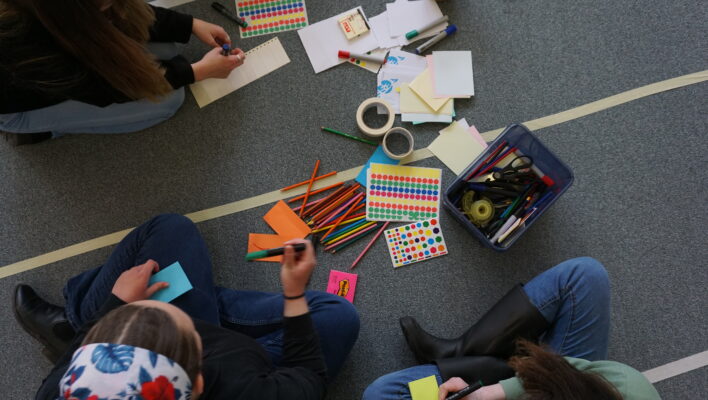
On 16 May 2024, during ATD Fourth World’s annual Away Day, activists with lived experience of poverty and team members made a presentation to our board of directors and trustees about our achievements over the past year, from crisis support to creative workshops that support well-being to public speaking. Here are highlights from the presentations.
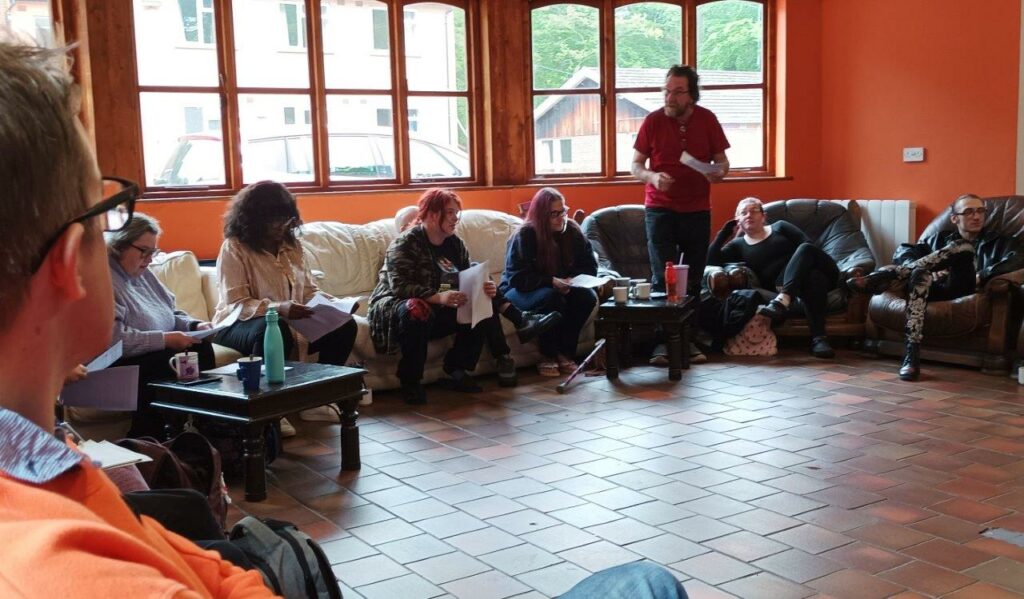
Family Crisis Support
- “ATD has made a huge difference in my life. I have felt that I am not alone and that I have support. They’ve instilled back some confidence in me, confidence that sometimes gets knocked down by our crazy system.
“With ATD, you remember to trust yourself again, and to do the right thing, regardless of what’s being thrown at you by life.”
- “Last year, my partner and I nearly lost our daughter. ATD came to the hospital [and stayed through the night] to support us, and that is when I said, yes, I can trust those people. When there was talking, like if I didn’t understand something, I could ask and be more confident. And you gave me emotional support. It shows that we can turn to you at any time.”
- “If I have to carry something on my own, it’s like a burden, I will get stressed out, and I find it difficult to express how I feel, how to cope with things. That is why it’s important to have your number, so I can say ‘I need to talk to you, I need help with something’.”
- “If I feel upset or let down, I can tell you any time. And if I’ve got something in my mind, like something very personal, you keep that in confidence. Trust is very important, that is the key.”
- “Whenever I’m concerned, I come here and we talk over it and I get some advice. I feel like it’s the right place, whereby a problem said is a problem solved. Here, you talk to good people, with experience.”
The Feltham Well-Being Group
In this project, the group meets up in a café once a month to have a good chat. It is a valuable way to break isolation for those who attend regularly. Participants are happy to see each other because this socialising is very important to them. It feels like a real treat to be meeting amongst friends and sharing a cuppa.
Each month, one of the participants will contact the core team to get upcoming dates put up on the group’s Messenger page. She takes it upon herself to remind others of upcoming meet-ups. That proves how much she values that time spent together.
Another participant, a mother with young children, will chat non-stop during our meet ups. It shows how much she needs that socialising time and contact with adults. It is also a space where people can discuss issues and questions they may have. Quite often, participants will share their own experience on a subject and offer ideas or advice. This kind of peer support can be invaluable.
Cuppa Chat Mornings
Twice a month at ATD’s London centre in Addington Square, the team organises a chat over a cup of tea or coffee. In particular, they invite mothers of young children who might be more isolated, as well as people they haven’t seen in a long time. During the Cuppa Chats, parents can express their struggles in a semi-private space. They spend more time one-to-one with team members, as well as meeting some peers.
Well-Being Days
Participants say:
- “At Addington Square, I feel happy, I feel at home. I really like coming here. Here, I relax. When we are here, we feel we are protected. We are loved. We eat healthy food. When we are going, the children don’t want to leave! Me too, I’m happy to be here.”
- “From school, my children come inside the house. But here [at ATD] there is a garden, they play bicycles, they play games, they paint, which we don’t have in our house. Coming here is a special day for them, they do a lot of activities.”
- “These well-being days are a relief.
“It’s amazing to be invited somewhere where you don’t feel like you are a burden, where people understand you.
- “Where you have a super lunch, participate in some activities. We love the arts and crafts — creating something, thinking about something. We always go away feeling empowered. To get time for yourself, it’s such a bonus. It’s such a privilege. Afterwards we say ‘oh that was a lovely day’. You go away feeling better, you go home and sleep well, you feel lovely. That’s unusual, that’s a treat!”
A Family Residential Well-Being Break
One mother says: “I can’t remember exactly when we went to our first break in Frimhurst, but I think that was probably the best thing that ever happened to my children in years in terms of a break away since we hadn’t really been on family holidays, for various reasons. Mostly, we couldn’t afford it.
“When you’re going to school and your friends or your peers went went somewhere on holidays, that’s something that’s always come up in my family where my children are going, ‘Oh, why aren’t we going on holidays?’ I’m explaining that actually we can’t really afford to go on holidays.
“Just about every time we’ve had the opportunity to go to Frimhurst, there’s always something different. That is quite exciting: in the arts and crafts room, the sports room, you might find new equipment, you might see changes. Every time just about, we’ve been with new families, meeting new people. There’s always a fresh outing, a fresh activity, a fresh idea.
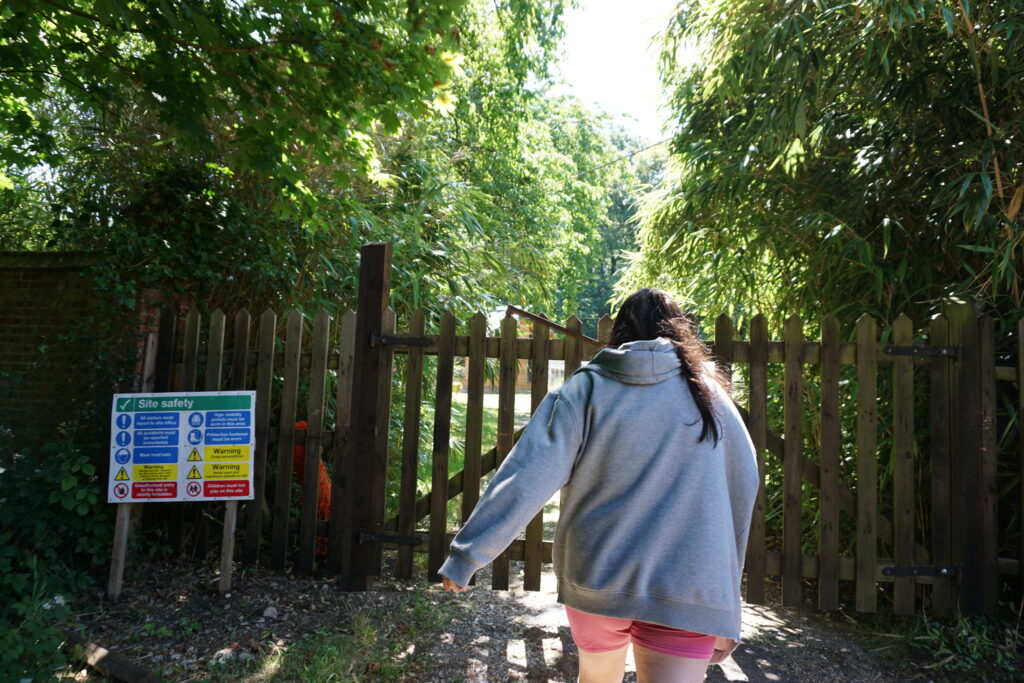
Calm After Trauma
“I think that you experience the benefit after; you don’t notice when you’re having fun in Frimhurst. But when you’re back and you reflect, then you realise how great it was and how much you needed that rest and how wonderful that actually is. Because then obviously you’re coming back to reality, it definitely feels like a rest.
“It’s been helpful to every single member of my family. I can’t see how it would be anything but good for people’s well-being and peace of mind in this world that we live in, and the situations we find ourselves in, no matter the struggle, no matter how hard you work, no matter how much time you give.
“For the older children. I think, having suffered their traumas this year, it’s been very helpful for them to have calm. The opportunity for them just to be with their family, it’s like a treat, and it was so needed. The fact that you can bond back with your family — we don’t get that chance. Eating together, sharing activities together, it’s a privilege.
“The memories that they have of this beautiful home in a beautiful setting, it’s just a million miles away from what our lives are generally in our small cramped houses.”
An Adult Residential Well-Being Break
“I enjoyed getting to know people and trying new things, I have new friends now. I loved the games room and the workshops. I liked to make soap, it was my first time and it was fun. It was nice to have a group of people of the same age. It helps to get to know more of the history of the people.”
“I enjoyed making a necklace, it was good for your hands and fine motor skills. The soap making too. In the past, I would have got angry and frustrated with that, but now I was relaxed with it, because the environment in Frimhurst is very relaxed. My PTSD was very relaxed in Frimhurst. I got three new people in my Facebook contacts. I enjoyed the morning walk inside the property.”
“I liked the movie night, making soap, making coasters and decorating a wooden spoon. It was really relaxing for me and it was the first time I did it. I find it difficult to socialise with people, I got on mainly with two new people I met, I got to know one in the way he made me feel included. We exchanged Facebook contacts. One has autism too so we understood each other.”
“I loved to wake up in the morning with birds.”
A New Project With People Seeking Asylum
In summer 2023, ATD was approached by Home-Start who had a small budget from the council to do a project with local asylum seekers. They wanted to reach new families but had nowhere to run their project as access was very restricted to a hotel close to Frimhurst where people seeking asylum are accommodated. ATD agreed to run this limited project with Home-Start at Frimhurst.
This pilot project was very successful and ATD and Home-Start saw that there was a need but as funding had stopped the project was dropped. Home-Start then gained access to offer a one-off family workshop at the hotel. An ATD Core Team member who visited the hotel described it this way:
“The building itself is quite depressing. Drapes and blind were closed and the decoration is very dated with damaged furniture.
“An activity was set up in the family room. This is the room that is accessible for families and children to play. There is nothing stimulating in there. There are a few tables, old sofas, a rack with old and tatty clothes that were donated and that residents can take if they need them. Not the kind of items I would give to charity.
“In the corner, there is a large cardboard box with some old stuffed toys and a lot of broken toys. Again all drapes and blinds and windows were closed so it was very dark and stuffy in there. There is a temporary fenced-in area at the front of the hotel with lots of bikes that the children can ride. Again, not very nice as there is debris everywhere and space is very limited.
“The staff say the children ‘trash everything’ but what I saw was a lot of very bored and under-stimulated children. No wonder they go a bit rambunctious at times.
“There are no toys or activities for babies and under 3’s. Children need age-appropriate toys to develop thinking skills, problem-solving abilities and reach milestones. I didn’t see anything that would stimulate a child’s cognitive, emotional and social development.”
Coffee Mornings for People Seeking Asylum
When ATD was approached by both Barnardo’s and a local church (St. Barbara’s) about the possibility to run a bi-monthly coffee morning at Frimhurst for the asylum seekers, ATD saw the importance of the impact it could make on this very isolated group of people. This is also a valuable opportunity for ATD to learn about their experiences and to start building links with Barnardo’s.
A lot of the families seeking asylum that the Frimhurst team got to know from this hotel have now moved to the North of the country after their immigration status was granted. There are some new families arriving regularly; but from what one of the residents has said there are now more families being moved than arriving. This has meant a slight drop in attendees.
For those who attend, this project is very important. They enjoy the hours they get to spend in this calm and relaxing setting as well as having a chance to make something for their children or for themselves.
The workshops are an opportunity to chat about their life; share about their country and their experiences. One attendee always says: ‘Thursdays are the best day!’
This project is important although it may not be possible to maintain long-term relationships with the asylum seekers. It is very much about learning and supporting each other in the present but it is a great opportunity to learn and to change perceptions of asylum seekers’ situation in the UK.
One of the residents of the hotel was telling ATD that anxiety is running very high about the new deportation law. There was much crying when the law was passed and a lot of residents are now very much living in fear. Therefore, having a chance to come and have two coffee mornings a month does a lot for their well-being and mental health. They always leave Frimhurst, happy and relaxed.
Giving Poverty a Voice (GPAV)
For this public side of our work, activists with lived experience of poverty work together in activist sessions three or four times a year. “That’s a good way for us to come together to talk over what’s on our minds. One of our sessions is this week, so we started working yesterday to prepare our presentations for today. And we’ll continue working tomorrow to prepare for some of the anti-poverty practice training that we’re going to deliver in September.”
Understanding Poverty
The project where we invite people to first start getting involved in GPAV is called Understanding Poverty. We continue to run monthly meetings and the theme activists chose to work on this year was preparing for the elections. We’ve talked about how different people first got the right to vote, including the suffragettes. We’ve talked about the differences between local and national elections. And we’ve worked out how to register to vote and what kinds of ID to bring to a voting office.
Also in these monthly meetings, we’ve invited different guests. Amnesty International came to ask us what they should say in a “lived-experience manifesto” they’re drafting to use with the new government. And we also hosted a “human rights open day” where Just Fair and Amnesty worked with us on how we can use the Human Rights Act to complain to an ombudsman when our rights are not respected.
We’ve continued to work as part of the APLE Collective (Addressing Poverty with Lived Experience). It’s now becoming an official charity to get its own funding and that means setting up a board of directors. APLE also travelled to the Wales Centre for Public Policy for a conference about the “poverty stigma”.
Another part of our work on Understanding Poverty is working with Poverty 2 Solutions. Activists said:
“We travelled to Stockton-on-Tees to get to know activists from another organisation who also live in poverty. We really enjoyed it because there’s a lot of different ways to get involved. Everyone was putting themselves out there. We’ll be updating the website to make it more friendly for people to access. Poverty 2 Solutions is also expanding our target audience, which is why Ruth has started making bookmarks for us to get the name Poverty 2 Solutions out there.”
“I also liked that Poverty 2 Solutions really catered to my needs. As soon as I said I had allergies, they were really on the ball. And we ended the session by decorating gingerbread people to show the different superpowers we all have.
“My superpower is flower power!”
Poverty Experts
This project is when ATD is invited to speak publicly on different topics. One invitation this year was for Patricia Bailey to go to Brighton to speak about problems with Universal Credit as part of an international conference on social protection. Pat said, “I really liked going because it makes you feel worthwhile and valued when they listen to what you have to say”.
Thomas Mayes travelled to Washington, D.C., to speak at a World Bank conference about presentation of ATD’s research on the Hidden Dimensions of Poverty. Thomas said:
“We met some policy makers there who believed what the UK government told them about the uplift given for the cost-of-living. I told them that wasn’t the whole picture because the uplift only goes to people on Universal Credit. People who get legacy benefits didn’t get it at all, even though they need help too. They also thought it was good that in the UK benefits go up in line with inflation — but they didn’t know that there’s a benefit cap that doesn’t go up with inflation at all.
“After I told them the truth, they did thank me for setting them straight and they went to look into it more. It was nice that they actually listened and discussed. Some politicians shoot you down at every level even when you know what you’re talking about. But at the World Bank, it was good that this guy wasn’t offended to be told he was wrong. He got his secretary to write it all down so he could look into it more. That’s why they need to hear from people with lived experience.”
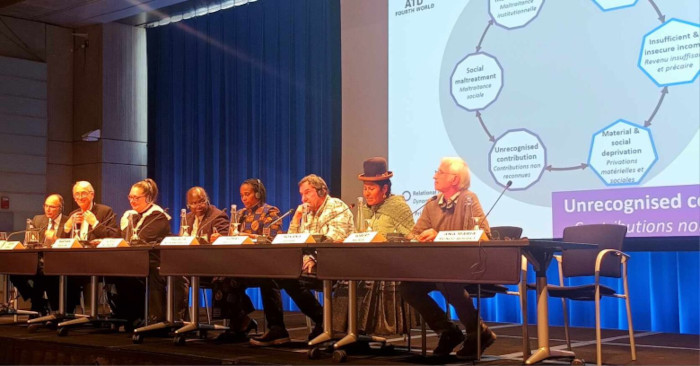
Another ‘Poverty Experts’ invitation we got was from the academic Action Research Journal. At their webinar to launch a special issue about “Transforming the Poverty Field”, both Patricia and Lareine Mouoguia were invited to present their reactions to two of their articles. About an article written by ATD Fourth World’s team in Tanzania, Lareine said:
“I was really struck that in Tanzania, one professor refused to join the project because he did not think he could discuss issues of poverty with a poor person. Processes are needed to open the eyes of the professors who are born with a golden spoon in their eyes. It is not their fault, but they do not know others’ realities.
“Everyone was bound by fear at the start of this study; but the process made sure that everyone felt valued, and no-one was rejected (which is what happens in normal life, through everyday interactions). Sitting with others, speaking and being properly heard is very uplifting, and cannot be underestimated. By the end of the project, people in poverty became bolder, and academics became more humble. This was nurturing something that had been dormant for years.”
The Right to Family Life
We continue to be active members of the Parents, Families and Allies Network. Our Youth Voices project has also been doing a lot this year. Because the young people said strongly how much social services interactions impact their identity, the Child Identity Protection organisation invited them to film a series of 16 video clips. These videos are about family separation, adoption, sibling rights, and the importance of children participating in decisions that affect them.
Also this year, the British Institute of Human Rights gave a grant to the Youth Voices project. This involved bringing the young people to the House of Lords for a special event on the 75th anniversary of the Universal Declaration of Human Rights. And finally, the young people got to design “What Are My Human Rights?“, a very accessible guide to give children a big picture view of the UK Human Rights Act of 1998. The guide explains how the law works, what responsibilities it gives to people who work for the government, and how people can use their rights effectively.
Also as part of the right to family life project, we’ve continued to deliver anti-poverty practice training. As in the past, we’ve done this with social work students, for example at the University of Birmingham and Royal Holloway. And the first time, we were also invited to deliver this training to doctoral trainees in clinical psychology. This took place at the University of Hertfordshire. Ruth Knibbs said:
“We had to change what we presented because the training psychologists get is very different from the training social workers get.
“A lot of times they’re at loggerheads with each other. When we told the psychologists how reports they write sometimes get misused by social workers, they were shocked. We really appreciated how engaged the trainees were. They asked really good questions and were very receptive.”
Other highlights
- Five activists from the UK took part in a European project on International Family Advocacy run by the International Movement ATD Fourth World. Patricia said: “One of the things we found in common in all the countries was that, from generation to generation, we pass on to our children a lot of fear and trauma related to the child protection system. And this means that when parents in poverty are struggling, it’s too scary to ask anyone for help.”
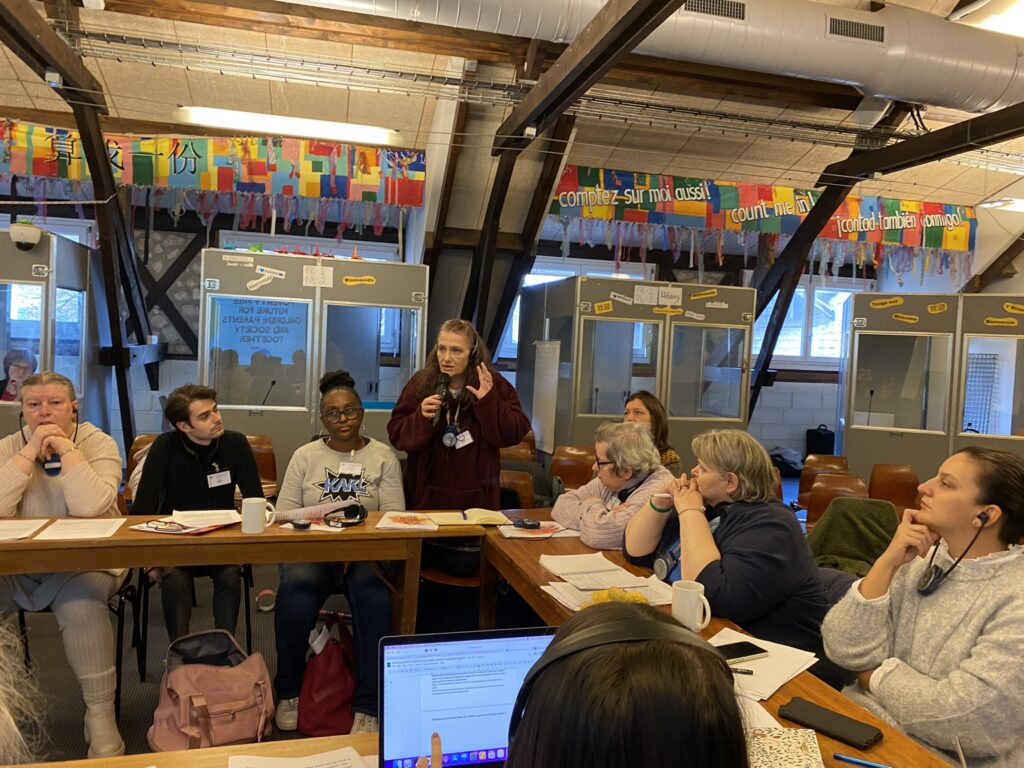
- Our work with GRIPP (the Growing Rights Instead of Poverty Partnership) is about poverty as a human rights issue in general, with ATD’s participation focused on the right to family life. GRIPP is led by lived experience but supported by partners with learned experience of poverty, like Amnesty International. In Amnesty’s print magazine for members, they put an article about GRIPP on the cover with 8-pages. And that article included an interview of Patricia with the title: “Forced Adoptions Are Horrendous”. That magazine was mailed out to 250,000 people.
- Our study group series has now run ten sessions since 2022. The early sessions fed into a study published by the University of Essex Human Rights Centre, called “Poverty, child protection and the right to protection and assistance to the family in England”. We are currently preparing to submit an article about the whole series to the Journal on Ethics and Social Welfare. The 9th study group, in February 2024, was on the theme of “the way forward” about what each of us needs in order to be able to create change.
Some parents said how hard it is to be told “you’re so brave” when actually they just have no other choice. Other parents said it’s frustrating to be told to “think positive” when you are stuck with a harsh social worker who shows no empathy. And still other parents said that thinking positively helps them to get up in the morning. We all approach challenges differently, the conversation about what we each need is an important one to have.
17th October, World Day to End Poverty
Lareine reflected: “For the big day this year, we were hosted at Amnesty International. That was great because it was so public! We had 150 people register, including a lot of people we don’t know. Sometimes ATD struggles to meet new people so it was really great to be in such a public place. Eva and I were the emcees and I also really enjoyed that. In this world with so much poverty and bad things happening
“I think it is so important to kick out the negativity and give people a feeling of joy just by being together and building community. And that’s what we did on the 17th October.”

